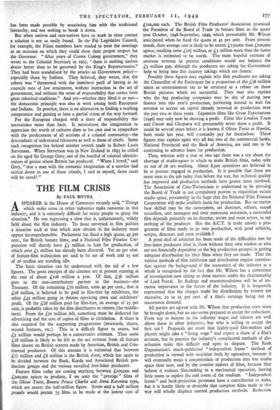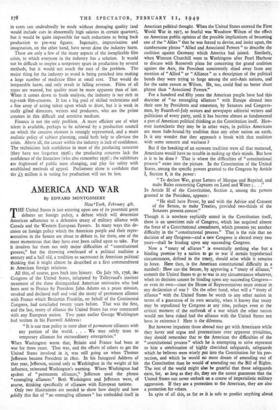THE FILM CRISIS
By PAUL BOTHA
ASPEAKER in the House of Commons recently said, "Things which make sense in other industries make nonsense in this industry, and it is extremely difficult for many people to grasp the situation." He was expressing a view that is, unfortunately, widely held about the film industry. To those unversed in film politics a situation such as that which now obtains in the industry must appear incomprehensible. Parliament has fixed a high quota, 45 per cent., for British feature films, and a National Film Finance Cor- poration will shortly have £5 million to loan for production, of which over £r million has already been allocated. Yet zo per cent. of feature-film technicians are said to be out of work and 15 out of 26 studios are standing idle.
The basic situation can be understood with the aid of a few figures. The gross receipts of the cinemas are at present running at the rate of about £1o8 million a year. Of this, £38 million goes to the non-contributory partner in the business—the Treasury. Of the remaining £70 million, some 40 per cent., that is £28 million, is believed to be paid in film-hire by exhibitors, the other £42 million going in theatre operating costs and exhibitors' profit. Of the £28 million paid for film-hire, an average of 25 per cent, is probably taken by the film distributors or renters (the middle- men). From the £21 million left, something must be deducted for advertising and the cost of copies of films in circulation. A share is also required for the supporting programmes (newsreels, shorts, second features, etc.). This is a difficult figure to assess, but £3 million would perhaps be a conservative estimate. Thus some £18 million is likely to be left as the net revenue from all feature films shown on British screens made by American, British .and Con- tinental producers. Of this amount it is estimated that between £71- million and ,C8_ million is the British share, which has again to be divided between the Rank, Korda and Associated British pro- duction groups and the various so-called free-lance producers.
Feature films today are costing anything between Lroo,000 and £200,000 apiece to produce, if we omit the " prestige " films of the Oliver Twist, Bonnie Prince Charlie and Anna Karenina type, which are nearer the half-million figure. Seven and a half million pounds would permit 75 films to be made at the lowest cost of
Lroo,000 each. The British Film Producers' Association promised the President of the Board of Trade 70 feature films in the quota year October, 1948-September, 1949, which presumably Mr. Wilson anticipated when he fixed the quota at 45 per cent. From present trends, their average cost is likely to be nearer £15o,000 than £too,000 apiece, totalling some Doi- million, or £3 million more than the home market is estimated to be worth. The most hopeful estimate of overseas revenue in present conditions would not balance the £3 million gap, although the producers are asking for Government help to bring into this country takings which are frozen.
Possibly these figures may explain why film producers are asking the Chancellor of the Exchequer for a proportion of the £38 million taken as entertainment tax to be returned as a rebate on those British pictures which are successful. They may also explain why the big producing companies may be shy of putting new finance into this year's production, preferring instead to wait for revenue to accrue on capital already invested in production over the past two or three years. Expensive films like Great Expectations (1946) may only now be showing a profit. Films like London Town and Caesar and Cleopatra will presumably never show a profit. It could be several years before it is known if Oliver Twist or Hamlet, both made last year, will eventually pay for themselves. These figures may explain again why all but two of the commercial banks, National Provincial and the Bank of America, are said not to be continuing to advance loans for production.
Thus, whereas only a year or two ago there was a cry about the shortage of studio-space in which to make British films, today only ii out of 26 are working. About 8,5oo operatives are believed to be at present engaged in production. It is possible that there are more men to the job today than before the war, but technical quality has improved and production methods have grown more involved. The Association of Cine-Technicians is understood to be pressing the Board of Trade to use compulsory powers to requisition vacant studio space, presumably in the hope that the National Film Finance Corporation will make available loans for production. But no matter how skilled may be the cameramen, art directors, editors, sound recordists, unit managers and their numerous assistants, a successful film depends primarily on its director, writer and main actors, to say nothing of producer. Has the A.C.T. (a trade union) a pro- gramme of films ready to go into production, with good subjects, scripts, directors and casts available ?
A great deal of criticism has been made of the difficulties met by free-lance producers (that is, those without their own studios or who are not financially dependent on the big production groups) in getting adequate distribution for their films when they are made. That the various methods of film exhibition and distribution require examina- tion against the background of the economics of the industry as a whole is recognised by the fact that Mr. Wilson has a committee of investigation now sitting on these matters under the chairmanship of Lord Portal. Its findings and recommendations will be of im- mense importance to the future of the industry. It is frequently represented that the charges made for distribution by renters are excessive, 20 to 25 per cent. of a film's earnings being not an uncommon demand.
All parties are agreed with Mr. Wilson that production costs must be brought down, but no one seems prepared to accept the reductions. From top to bottom in the industry wages and salaries are well above those in other industries, but who is willing to accept the first cut ? Proposals are made that highly-paid film-makers and players might take a "living wage" and expect a share of a film's revenue, but in practice the industry's complicated methods of dis- tribution make this difficult and open to dispute. The Rank Organisation's much-publicised "independent frame" method of production is viewed with suspicion both by operatives, because it will eventually mean a concentration of production into less studio space than now, and by the creative makers of films, because they believe it reduces film-making to a mechanical operation, leaving little room to exploit the real assets of the medium. "Independent frame" and back-projection processes have a contribution to make, but it is hardly likely or desirable that complete films made in this way will wholly displace normal production methods. Reduction in costs can undoubtedly be made without damaging quality (and would include cuts in abnormally high salaries in certain quarters), but it would be quite impossible for such reductions to bring back production to pre-war figures. Ingenuity, improvisation and imagination, on the other hand, have never done the industry harm.
These are only a few of the many aspects of the inexplicable film crisis, to which everyone in the industry has a solution. It would not be difficult to inspire a temporary spurt in production by several methods, but it would not touch the root of the problem. The major thing for the industry to avoid is being panicked into making a large number of mediocre films at small cost. That would do irreparable harm, and only result in falling revenue. Films of all types are wanted, but quality must be more apparent than of late. When it comes down to frank analysis, the industry is not rich in top-rank film-creators. It has a big pool of skilled technicians and a fine array of acting talent upon which to draw, but it is weak in really gifted directors, writers and producers, who are the prime creators in this difficult and sensitive medium.
Finance is not the only problem. A more efficient use of what talent is available, perhaps to be achieved by a production council on which the creative element is strongly represented, and a more realistic policy of subject planning, could both help to alleviate the crisis. Above all, the cancer within the industry is lack of confidence. The technicians lack confidence in most of the producing concerns (they have not forgotten 1936) ; the producing concerns lack the confidence of the financiers (who also remember 1936) ; the exhibitors ere frightened of public taste changing, and play for safety with established methods of appeal. Parliament alone is confident that the £5 million it is voting for production will not be lost.







































 Previous page
Previous page